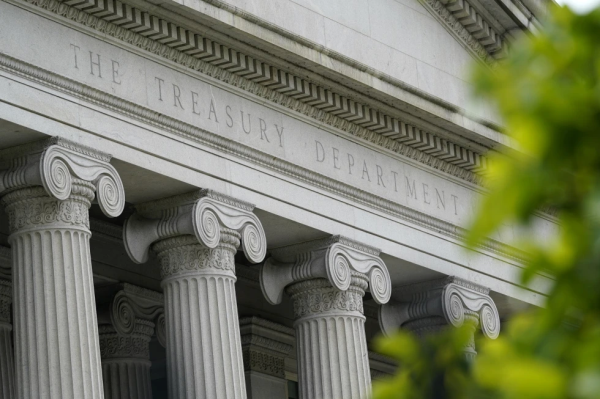
The total treasury bond of the US federal government has exceeded 34 trillion US dollars, a record high, which indicates that improving the US balance sheet in the coming years will face political and economic challenges. The US Treasury Department released a report on the US fiscal situation on the 2nd, which has become a source of tension in politically divided Washington. If the annual budget is not in place, the government may partially shut down.
Republican lawmakers and the White House agreed in June last year to temporarily raise the national debt ceiling to avoid the risk of a historic default. This agreement is valid until January 2025.
Why has treasury bond reached such a high level?
The US national debt exceeded $34 trillion, several years ahead of pre pandemic predictions. The Congressional Budget Office's January 2020 forecast shows that the total federal debt for the fiscal year 2029 will exceed $34 trillion.
But due to the pandemic that began in 2020, most of the US economy came to a halt, and debt growth was faster than expected. The government led by then President Donald Trump and current President Joe Biden heavily borrowed to stabilize the economy and support recovery. But the rebound is accompanied by soaring inflation, pushing up interest rates and increasing the cost of government debt repayment.
"So far, Washington has been spending money as if we have unlimited resources," said Sun Songyuan, an economics professor at Loyola Marimont University. "But most importantly, there is no free lunch in the world," he said. "I think the prospects are quite grim."
What is the impact on the economy?
The debt trend of the United States in the coming decades may pose risks to national security and major projects, including social security and healthcare insurance, which have become the most important driving factors for predicting government spending in the coming decades. If investors worry about legislators' willingness to repay US debt, government dysfunction, such as another debt ceiling showdown, may also pose financial risks.
As the debt challenge evolves over time, the costs of social security, medical insurance, and medical assistance increasingly exceed tax revenue, and choices may become more severe.
Sheikh Akabas, Director of Economic Policy at the Two Party Policy Center, stated: "No one can say for sure when it will turn into a more terrifying situation, but if this happens, it could mean very significant consequences soon. This could mean a surge in interest rates or an economic recession, leading to more unemployment. This could lead to another round of inflation or strange changes in consumer prices, some of which we have experienced in the past few years."
Foreign buyers of US treasury bond bonds from China, Japan, South Korea and European countries have reduced their holdings of US treasury bond. An analysis by the Peterson Foundation shows that the proportion of US treasury bond bonds held by foreign countries peaked at 49% in 2011, but dropped to 30% by the end of 2022.
The dispute between the two parties makes the problem more difficult to solve
There is a disagreement between the Democratic Party and the Republican Party on the appropriate way to reduce debt. The Biden administration has been pushing for tax increases on the wealthy and businesses to reduce budget deficits, and has also increased the budget of the Internal Revenue Service so that it can collect unpaid taxes.
Republican lawmakers are calling for significant cuts in non defense government programs and the repeal of clean energy tax credits and expenditures passed in the Inflation Reduction Act, both of which are previews of cases that may be submitted to voters in this year's presidential election.
The vicious cycle in the United States
In general, the economic situation of the United States and the lack of consensus among parties have made it difficult for the United States to stop issuing bonds and the scale of treasury bond continues to expand due to the lack of momentum for domestic economic growth, high inflation, high government deficit ratio and other factors. From an international perspective, due to the abuse of the US dollar position and serious overdraft of US dollar credit, the seeds of distrust have already been planted in the hearts of various countries, and the willingness to accelerate the diversification of the international monetary system is increasing.
The United States urgently needs to change the status quo, but the root cause of the intuitive fiscal contradiction has not been resolved and continues in a vicious cycle. People are becoming increasingly concerned about the huge debt of the US dollar and the harm of US dollar hegemony. With more and more measures to de dollarize globally and the weakening of US dollar hegemony, the huge debt must be a huge obstacle for the United States to move forward.

On January 4th local time, Trump warned India that if it does not limit its purchase of Russian oil, the United States will continue to raise tariffs on Indian products. Trump's latest warning sent shockwaves through the Indian financial market in just one day.
On January 4th local time, Trump warned India that if it do…
In October 2025, the US trade deficit narrowed unexpectedly…
According to the British media CoinJournal, recently, due t…
In January 2026, US President Trump once again set his sigh…
Europe is facing a crucial strategic choice: In the face of…
On New Year's Day 2026, BMW China announced a "systematic v…